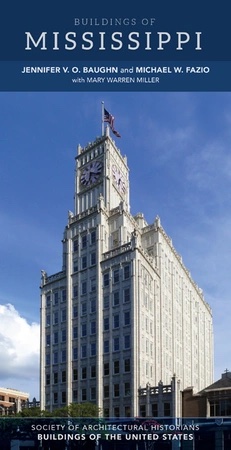“The little town built crazily here on the edge of the hills,” in the words of Yazoo City’s most famous writer, Willie Morris, overlooks a sharp bend in the Yazoo River above the annual floodline. Laid out in 1830 as Manchester, it became Yazoo City in 1841 and took the county seat from Benton in 1848. When the first leg of the Yazoo and Mississippi Valley Railroad was completed in 1885, it expanded the town’s reach into the cotton fields of the Mississippi Delta. Cotton and wholesale warehouses, a cotton oil mill, and a large textile mill were built along the railroad.
In May 1904, a fire destroyed 324 buildings including the 18-block downtown. Only one downtown church, Bethel AME (1891; 214 S. Monroe Street) survived the fire. Newspapers estimated that the population doubled to around 10,000 almost overnight as builders and architects, including P. H. Weathers of Jackson and R. H. Hunt of Chattanooga, arrived to join local contractors W. O. Glass and William Morford.
A second, more sustained boom began with the discovery of oil in Yazoo County in 1939. After World War II, native son John E. “Jack” Decell (1936–1985), a Yale architecture graduate, put his stamp on Yazoo City from his home office at 327 E. Madison Street. Since 2004, the bankruptcy of the city’s major employer, Mississippi Chemical Corporation, which was established as a farmer’s cooperative in 1948, has brought economic decline, and the downtown has suffered.
Writing Credits
If SAH Archipedia has been useful to you, please consider supporting it.
SAH Archipedia tells the story of the United States through its buildings, landscapes, and cities. This freely available resource empowers the public with authoritative knowledge that deepens their understanding and appreciation of the built environment. But the Society of Architectural Historians, which created SAH Archipedia with University of Virginia Press, needs your support to maintain the high-caliber research, writing, photography, cartography, editing, design, and programming that make SAH Archipedia a trusted online resource available to all who value the history of place, heritage tourism, and learning.

